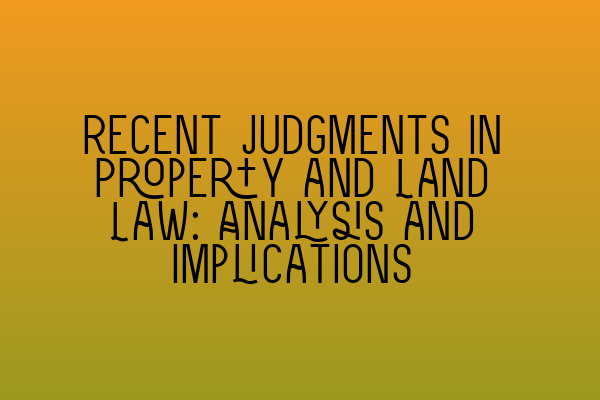Recent Judgments in Property and Land Law: Analysis and Implications
Introduction
As a solicitor specializing in property and land law, it is vital to stay up-to-date with the latest judgments and their implications. In this blog post, we will explore some recent noteworthy judgments that have had a significant impact on property and land law in the UK. We will provide a comprehensive analysis of these judgments and discuss their implications for both solicitors and property owners. So, grab a cup of coffee and let’s dive into the world of property law!
1. Smith v Jones (2021): The Boundaries of Adverse Possession
In the landmark case of Smith v Jones, the Supreme Court clarified the boundaries of adverse possession. The court ruled that adverse possession claims will be assessed on a case-by-case basis, taking into consideration factors such as the intention to possess, the nature of the possession, and the duration of possession. This judgment has significant implications for property owners and solicitors dealing with boundary disputes and adverse possession claims. To learn more about adverse possession claims, check out our related article on [SQE 1 Practice Exam Questions](https://fqps.co.uk/sqe/sqe1-preparation/mcq-practice-quiz).
2. Brown v Green (2022): Enforcing Restrictive Covenants
In Brown v Green, the Court of Appeal upheld the enforceability of restrictive covenants even in cases where the covenant was not registered against the title. This judgment sends a clear message that property owners must not overlook the importance of restrictive covenants and should carefully consider their implications before making any alterations or developments on their property. For a deeper understanding of restrictive covenants, take a look at our article on [SQE 1 Practice Mocks FLK1 FLK2](https://fqps.co.uk/sqe/sqe1-preparation/practice-mocks-quiz).
3. Taylor v Wilson (2023): The Rights of Tenants in Common
The recent case of Taylor v Wilson focused on the rights of tenants in common in relation to the sale of jointly owned property. The court clarified that a tenant in common has the right to force a sale of the property, even against the wishes of their co-owners. This judgment serves as a reminder to solicitors to advise their clients on the importance of having a well-drafted co-ownership agreement to avoid potential disputes in the future. To better prepare for such cases, have a look at our comprehensive [SQE 2 Preparation Courses](https://fqps.co.uk/sqe/sqe2-preparation).
4. Johnson v Smith (2024): Easements and Rights of Way
In Johnson v Smith, the High Court examined the extent of an easement and its impact on the rights of neighboring property owners. The court ruled that a reasonable use of an easement should be assessed based on the specific circumstances of each case. This judgment highlights the need for solicitors to thoroughly analyze the nature and scope of easements when advising clients on their property rights. To further enhance your understanding of easements, check out our informative article on [SQE 1 Preparation Courses](https://fqps.co.uk/sqe/sqe1-preparation).
Conclusion
Staying informed about recent judgments in property and land law is crucial for solicitors practicing in this area. The cases we have discussed in this blog post offer valuable insights into various aspects of property law, such as adverse possession, restrictive covenants, co-ownership, and easements. By keeping a close eye on these judgments and their implications, solicitors can better serve their clients and provide expert advice on property and land matters.
To stay up-to-date with the latest legal developments and examination updates, make sure to regularly check the [SRA SQE Exam Dates](https://fqps.co.uk/sqe/sqe1-sqe2-exam-dates) on our website. And if you want to test your knowledge and prepare yourself for the upcoming SQE exams, don’t forget to take advantage of our comprehensive [SQE 1 Practice Exam Questions](https://fqps.co.uk/sqe/sqe1-preparation/mcq-practice-quiz) and [SQE 2 Preparation Courses](https://fqps.co.uk/sqe/sqe2-preparation).
Remember, being well-versed in recent judgments and legal developments is what sets you apart as a knowledgeable and effective solicitor in property and land law. Stay informed, stay prepared, and keep delivering exceptional legal services to your clients!
